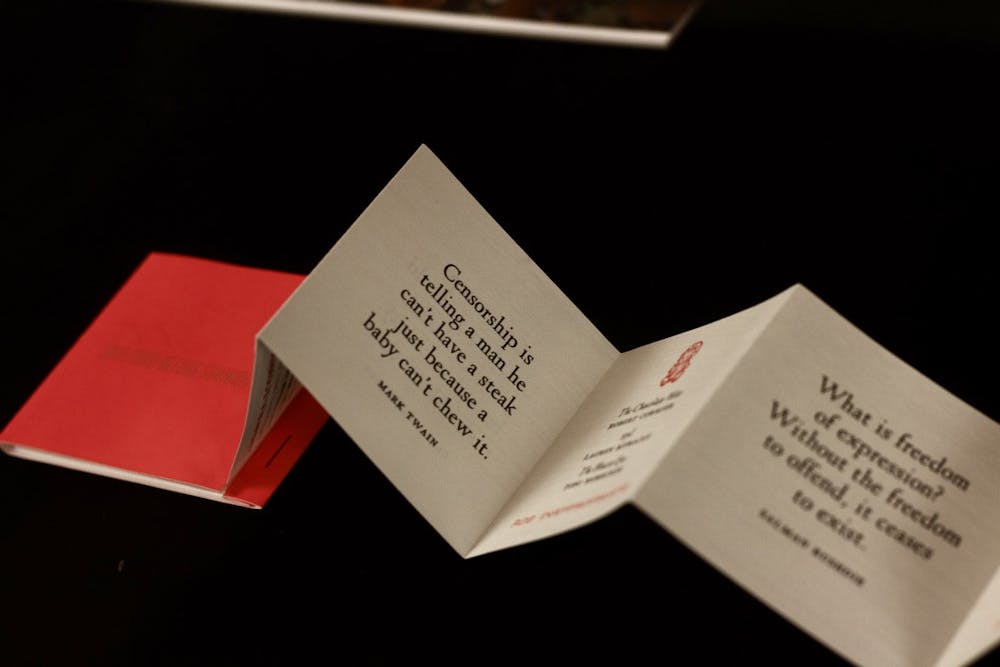Mark Twain, dubbed the “American father of literature,” once said, “Censorship is telling a man he can’t have steak because a baby can’t chew it.” This quote can be seen on display at Alden Library’s fourth floor as part of its “Let It Burn” exhibit. The exhibit seeks to spark conversation about censorship, specifically book burning, by hosting an interactive and visual element for those interested to enjoy. “Let It Burn” will be viewable until the end of fall semester.
The exhibit, co-curated by Miriam Intrator, Alden’s special collections librarian, and Michele Jennings, the library’s former art librarian, was inspired both by an evident theme of fire and burning across numerous books in the library, as well as the increase of books being banned in the present-day U.S.
The exhibit will be open during Banned Books Week, which falls on the first week of October, and the library plans to host activities surrounding the exhibit. This week is specifically relevant to current U.S. news with over 1,586 book bans in schools from July 2021 to March 2022, according to National Geographic.
The “Let It Burn” exhibit itself features a fiery array of pieces, including infographics, trinkets and artists' books, which are books considered to be art objects. Artists' books are emphasized by the exhibit and offer a unique take on literature and art.
“They are not normal books in how you interact with them,” Intrator said. “It can feel like play in some ways to be interacting with an artists’ book. Then there's the other side of it, where (the book) can be about a very serious topic. It's kind of playing on all sides of your brain when you are interacting with the books, and that's kind of an important piece also, I think.”
One of Intrator’s goals for “Let It Burn” was to increase students' interest in rare books and different manners of learning about history.
“There are different ways to get people to think about different things,” she said. “It doesn't have to be a dry academic paper or a newspaper article. You can create a book that is very beautiful and that's a work of art and that is also teaching you about something really important and very serious.”
The exhibit includes popular modern American classics such as Ray Bradbury’s “Fahrenheit 451,” as well as rare editions of artist books such as “Celsius 33” and “Emergence.”
Shedding light on the increase in book banning and censorship in modern-day America was one of the main objectives of this exhibit. According to the American Library Association, there has been a 20% increase in individual book titles challenged since 2022– with most of the challenged books being linked to LGBTQIA+ communities or people of color in some capacity.
This increase in banned books also coincides with political action aimed at censoring “controversial” discussions in schools such as Florida’s HB 1557, also known as the “Don’t Say Gay” law, and similar academic censorship efforts around the nation.
Students from Ohio University hold their own thoughts on this issue. Stan Yerrick, a junior studying political science, makes a personal connection to censorship in American schools.
“I grew up in Akron, and even in sort of an urban education, we still did not get a lot of vital information that we needed to know about the way this country was formed,” they said. “I think even here, there's a lot of stuff that doesn't get talked about. You have a lot of professors that don't talk about certain subjects because it's sensitive and stuff, but it's also the truth.”
This idea of sensitive topics needing to be censored has been a common debate among political leaders, parents and students in the U.S. Yerrick is not alone in their opinion, with 75% of Americans opposing book banning, according to Every Library Institute.
Joey Hilliard, a junior studying astrophysics, discussed the implications that this increase in banning books and censorship has on impressionable students.
“I think the effect that (banning and censorship) has is that it just requires more work to be an informed citizen, into (becoming) a global citizen,” Hilliard said.
Intrator emphasized the importance of being aware of resources available to students in this era of increased book banning, and these ideas are highlighted in the “Let It Burn” exhibit. With resources such as free downloadable banned books to read, and the Mahn Center’s rare books request form, Alden Library offers multiple resources for students interested in exploring rare or banned books. Along with digital resources, there are multiple events coordinated with the exhibit, beginning with a “Matchbook Book-Making” crafting activity on Sept. 28.
“Limiting people's access to information, to knowledge, learning (and) understanding is just incredibly dangerous,” Intrator said. “I don't feel like I'm taking any political side. I just feel that people should have access to whatever resources they want or need to have access to.”
The exhibit allows students to take a peak into America’s past and learn more about the information and resources available. The emphasis on ‘knowledge being power’ is present in Intrator and Jennings’ work in the display, as well as in Alden Library’s influx of student resources to combat censorship.






